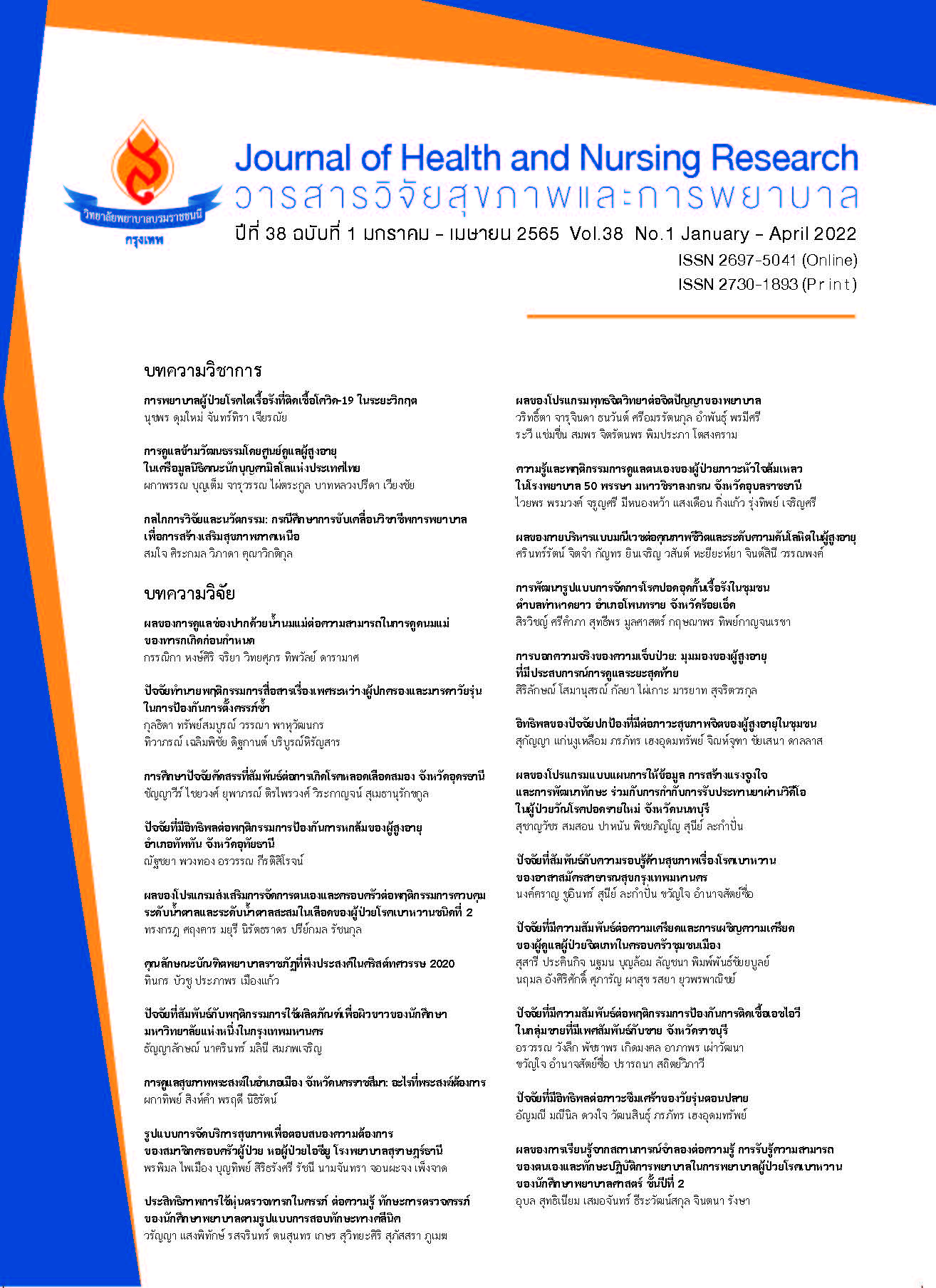ปัจจัยที่สัมพันธ์กับพฤติกรรมการใช้ผลิตภัณฑ์เพื่อผิวขาวของนักศึกษามหาวิทยาลัยแห่งหนึ่งในกรุงเทพมหานคร
คำสำคัญ:
ผลิตภัณฑ์เพื่อผิวขาว , นักศึกษา, พฤติกรรมการใช้ผลิตภัณฑ์เพื่อผิวขาวบทคัดย่อ
บทคัดย่อ
บทนำ: นักศึกษามหาวิทยาลัยมีความนิยมการมีผิวขาว และในปัจจุบันพบผลิตภัณฑ์เพื่อผิวขาวที่ผิดกฎหมาย เช่น การลักลอบผลิตหรือนำเข้าเครื่องสำอางโดยไม่ได้รับอนุญาต การแสดงฉลากเครื่องสำอางที่ไม่ถูกต้อง การโฆษณาโอ้อวดเกินจริงผ่านสื่อต่าง ๆ และการหลอกลวงในเรื่องที่มาหรือแหล่งผลิตรวมถึงการแสดงเลขที่ใบรับแจ้งปลอม นอกจากนี้ยังพบปัญหาการลักลอบใช้สารต้องห้าม เช่น ปรอท ไฮโดรควิโนน เป็นต้น ซึ่งอาจนำไปสู่ปัญหาทางสุขภาพ
วัตถุประสงค์การวิจัย: เพื่อศึกษาปัจจัยที่สัมพันธ์กับพฤติกรรมการใช้ผลิตภัณฑ์เพื่อผิวขาวของนักศึกษามหาวิทยาลัยแห่งหนึ่งในกรุงเทพมหานคร
ระเบียบวิธีการวิจัย: การสำรวจแบบตัดขวางโดยใช้แบบสอบถามที่ตอบด้วยตนเอง เครื่องมือที่ใช้ในการวิจัยเป็นแบบสอบถามผ่านการตรวจสอบด้วยความตรงของเนื้อหาและวิเคราะห์หาความเที่ยง กลุ่มตัวอย่างจำนวน 352 คน ในมหาวิทยาลัยแห่งหนึ่งในกรุงเทพมหานคร วิเคราะห์ข้อมูล ด้วยค่าสถิติ จำนวน ร้อยละ ค่าเฉลี่ย ส่วนเบี่ยงเบนมาตรฐาน วิเคราะห์ความสัมพันธ์ด้วยสถิติทดสอบไคสแควร์ กำหนดระดับนัยสำคัญทางสถิติที่ระดับ .05
ผลการวิจัย: ร้อยละ 50 ของกลุ่มตัวอย่างใช้ผลิตภัณฑ์เพื่อผิวขาวชนิดทาภายนอก รองลงมาการรับประทาน ร้อยละ38.64 และการฉีด ร้อยละ 11.36 ปัจจัยที่สัมพันธ์กับการใช้ผลิตภัณฑ์เพื่อผิวขาว ได้แก่ อายุ บุคคลที่พักอาศัยด้วย เจตคติต่อการใช้ผลิตภัณฑ์เพื่อผิวขาว การรับรู้โอกาสเสี่ยงต่อพฤติกรรมการใช้ผลิตภัณฑ์เพื่อผิวขาว การรับรู้ความรุนแรงต่อการใช้ผลิตภัณฑ์เพื่อผิวขาว อิทธิพลจากเพื่อน อิทธิพลจากครอบครัว อิทธิพลจากบุคคลที่ชื่นชอบ อิทธิพลจากบุคลากรทางการแพทย์ อิทธิพลจากพนักงานขาย และอิทธิพลปัจจัยเสริมภาพรวม
ข้อเสนอแนะ: สามารถเป็นแนวทางให้หน่วยงานที่รับผิดชอบในการให้ความรู้เกี่ยวกับอันตรายของผลิตภัณฑ์เพื่อผิวขาว และออกมาตรการในการคุ้มครองผู้บริโภคที่ใช้ผลิตภัณฑ์เพื่อความขาวสามารถแก้ไขปัญหาให้ทันกับสถานการณ์ที่งานวิจัยนี้ค้นพบต่อไป ทั้งนี้เพื่อความปลอดภัยของผู้บริโภค
Downloads
เอกสารอ้างอิง
2. KesornPrasongkool1 , Chidchanok Ruengorn. Analysis of the Situation on Contamination of Prohibited Harmful Substances in Facial Cosmetics In AmphurNangrong, Buriram Province During 2013-2016. Thai Journal of. Pharmacy Practice 2017;9(2):361-9.
3. Cosmetic Control Group Food and Drug Administration. List of establishments that have GMP certification [Internet]. 2019 [cited 2020 January 10]. Available from: http://www.fda.moph.go.th/sites/Cosmetic/ViewGMP
4. Orasa Phucharern, Atthaphol Rodkaew, Chitsirin Konkong. Knowledge attitude and consumer behavior of Glutathione products among university students. PSRU Journal of Science and Technology 2018; 3(3):50-63.
5. Thaksinee Sripon, Benjamaporn Kesama, Suttasinee Suwannakul, Narongchai Chaksupa, Suwanna Phattarabenjapol. The use of glutathione for whitening skin among UbonRatchathani University students according to the theory of planned behavior. IJPS 2016;11(Supplement): 171-8.
6. Green, L. W., & Kreuter, M. W. Health promotion planning: An educational and ecological approach (3rd ed.). Mountain View, CA: Mayfield; (1999).
7. Faculty of Medicine Ramathibodi Hospital Mahidol University Ramathibodi Pharmacy. Dangers of banned substances in cosmetics [Internet]. 2019 [cited 2020 April 10]. Available from: www.med.mahidol.ac.th
8. Paponson Klanruangsang. Decision Making About Skin Whitening Products among Undergraduate Student in Bangkok. KKU RESEARCH JOURNAL (GRADUATE STUDY) 2018;18(1):13-23.
9. Chutima Sritoomma. Dietary Supplement Consumption Behaviour of Bachelor’s Degree Students in Social Sciences, Khon Kaen University. KKU Journal for Public Health Research 2015;8(4):6-13.
10. Hathaithip Dangpathio. Marketing Mix, Attitudes and Motives Affecting the Purchasing Decision in Nutritional Supplements for Whitening Skin of Teenagers in Bangkok [master’s thesis]. Bangkok: Bangkok University; 2017. (in Thai).
11. Thitikan P, Phansapon K. The Behaviors of consuming supplementary food of students Kamphaeng Phet Rajabhat University MaeSot. Naresuan 12th researches and innovation for development 2016;12:1439-51.
ดาวน์โหลด
เผยแพร่แล้ว
รูปแบบการอ้างอิง
ฉบับ
ประเภทบทความ
สัญญาอนุญาต
ลิขสิทธิ์ (c) 2022 วารสารวิจัยสุขภาพและการพยาบาล (วารสารวิทยาลัยพยาบาลบรมราชชนนี กรุงเทพ)

อนุญาตภายใต้เงื่อนไข Creative Commons Attribution-NonCommercial 4.0 International License.
บทความที่ได้รับการตีพิมพ์ เป็นลิขสิทธิ์ของวารสารวิจัยสุขภาพและการพยาบาล (วิทยาลัยพยาบาลบรมราชชนนี กรุงเทพ) ไม่สามารถนำไปตีพิมพ์ซ้ำในวารสารฉบับอื่น


















